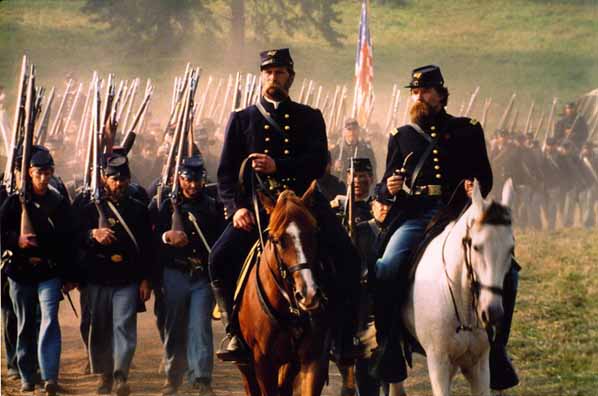
Ron Maxwell’s 1994 Gettysburg is the gold standard of Civil War films. It follows Michael Shaara’s superb historical novel The Killer Angels and depicts the decisive three day battle. It was filmed on the actual battlefield with re-enactors. Maxwell took great care in maintaining historical accuracy. Civil War buffs will recognize many lines of dialogue as historical, as well as shots that recall famous photographs. In addition, Gettysburg is especially well-acted, especially by Jeff Daniels, Tom Berenger, Stephen Lang, Sam Elliott and Brian Mallon.
The other very best Civil War movie is the 1989 Glory, which tells the real-life story of an all-black unit in the Union Army. Glory has tremendous performances by Denzel Washington, Andre Braugher, Morgan Freeman and Jihmi Kennedy.
Other notable Civil War films
The General (1927): This silent film is Buster Keaton’s masterpiece. The story in The General is based on a real incident in the Civil War, Andrew’s Raid (or the Great Locomotive Chase) of 1862.
Gone with the Wind (1939): This epic is rightly criticized for its glorification of the Southern ante-bellum lifestyle based on slavery and its stereotypically racist treatment of African-Americans. But it accurately captures the attitude of the Southern fire-eaters during Secession and the war fever of the women of the Southern elite. It also shows the aftermath of the Battle of Atlanta and opens the second half of the movie with the wonderful shot that pans across hundreds of Confederate wounded.
The Beguiled (1971): This underrated drama tells the Southern Gothic tale of a wounded Union soldier (Clint Eastwood) who takes refuge in a sexually-repressed Southern all-girls boarding school. Transitioning between Spaghetti Westerns and Dirty Harry, Clint plays against type in a fine movie that bombed in the US, but is admired in France.
Cold Mountain (2003): This all-star epic adaptation of a best-selling novel is not a compelling film. However, it does depict the Battle of the Crater at Petersburg, and is an excellent rendering of the exhausted and deprived condition of the South late in the War.
The Red Badge of Courage (1951): This is John Huston’s adaptation of the great Stephen Crane novel. It is faithful to the novel and has a fine supporting cast (especially Royal Dano), but suffers from the acting limitations of its star, real-life war hero Audie Murphy. Read the novel instead.
Gods and Generals (2003): This is Ron Maxwell’s prequel to his exquisite Gettysburg, based on the Jeffrey (son of Michael) Shaara novel. Although Gettysburg’s filmmakers and many of the key actors were involved, Gods and Generals is an abject failure. The film plods through its non-combat scenes and has a pro-Confederate bias. There is an eye-rollingly painful scene of a fictionalized midnight apologia of slavery between Stonewall Jackson and a slave. Gods and Generals depicts the Battles of First Bull Run, Fredericksburg and Chancellorsville (and Antietam in the six-hour version).
C.U.S.A.: The Confederate States of America (2004): This is a contemporary mockumentary that imagines the American narrative if the Confederacy had won the war. It’s very funny and very telling.
